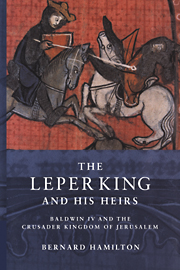Book contents
- Frontmatter
- Dedication
- Contents
- List of illustrations
- Acknowledgements
- List of abbreviations
- Maps
- Genealogies
- Glossary
- Prologue
- 1 The sources for Baldwin IV's reign
- 2 Baldwin's childhood
- 3 The kingdom
- 4 The international status of the kingdom
- 5 The king's minority
- 6 Western aid. William of Montferrat and Philip of Flanders
- 7 The victor of Mont Gisard
- 8 Prince Reynald's initiative
- 9 The dying king
- 10 The heirs of the leper king
- Epilogue
- Appendix An evaluation of the leprosy of King Baldwin IV of Jerusalem in the context of the medieval world
- Bibliography
- Index
9 - The dying king
Published online by Cambridge University Press: 05 February 2015
- Frontmatter
- Dedication
- Contents
- List of illustrations
- Acknowledgements
- List of abbreviations
- Maps
- Genealogies
- Glossary
- Prologue
- 1 The sources for Baldwin IV's reign
- 2 Baldwin's childhood
- 3 The kingdom
- 4 The international status of the kingdom
- 5 The king's minority
- 6 Western aid. William of Montferrat and Philip of Flanders
- 7 The victor of Mont Gisard
- 8 Prince Reynald's initiative
- 9 The dying king
- 10 The heirs of the leper king
- Epilogue
- Appendix An evaluation of the leprosy of King Baldwin IV of Jerusalem in the context of the medieval world
- Bibliography
- Index
Summary
The events of 1182 had placed a great strain on the financial resources of the kingdom, and at a curia generalis held at Jerusalem in February 1183, to which representatives of the Frankish burgesses were also summoned, it was enacted that a 1 per cent tax should be levied on all property with a value of 100 bezants or more, and a 2 per cent tax on all annual incomes of 100 bezants or more. Households whose property or income was below those thresholds should normally be charged a flat rate of 1 bezant. This tax was to be paid by the entire population ‘of whatever tongue, of whatever race, of whatever creed and of both sexes’. Arrangements were made for the assessment and collection of this tax at a local and regional level, and it was stipulated that the money should be spent solely for defence purposes and not used to defray the general expenses of government. This was one of the earliest provisions made in the Christian world for the collection of income tax, and it ended with a pious expression of hope, which sadly has proved ill founded: ‘And let this be done once and not taken as a precedent by later generations.’
Benjamin Kedar has pointed out that the form of the tax and the procedures for its collection were modelled very closely on those used by Henry II of England and Louis VII of France when levying a general tax for the support of the Holy Land in 1166. He justly observes that it would indeed be surprising if this revolutionary fiscal policy had originated in the administratively backward Latin Kingdom of Jerusalem, and has suggested that Stephen of Sancerre, who brought the money raised in France in 1166 to Jerusalem in 1171, may have supplied information about how it had been collected. It is equally possible that the members of the curia generalis learned of this system from some distinguished western visitor present in the kingdom in 1183.
- Type
- Chapter
- Information
- The Leper King and his HeirsBaldwin IV and the Crusader Kingdom of Jerusalem, pp. 186 - 210Publisher: Cambridge University PressPrint publication year: 2000



